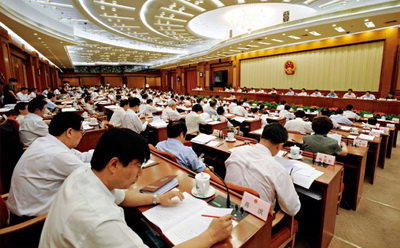People's Congress to Reduce Impact of Changes to Vehicle and Vessel Tax

Feb 23, 2011
Translated by Guo Wei
Economic Observer Online
Original article: [Chinese]
The Standing Committee of China's National People's Congress (NPC) normally meets once every couple of months in order to review and debate draft laws, listen to and deliberate on various amendments to existing laws and also to receive special reports on a variety of subjects.
Today the 19th meeting of the 11th NPC Standing Committtee got underway in Beijing with 156 of the 175-member standing committee attending the opening meeting.
One of the major issues that will be discussed during this week's meetings, is the draft amendment to China's Vehicle and Vessel Tax law.
The country's vehicle and vessel tax was first introduced in 1986, it taxes the owners of vehicles according to the size of the engine.
This will be the second reading of the draft amendments to the law after the standing committee first reviewed the proposed changes last October.
The proposed amendments include major changes to the existing law.
It's been reported that this second draft of amendments will reduce the tax levied on passenger vehicles with engine capacity equal to or below 2.0 liters.
At present, passenger vehicles with an engine capacity of 2 liters or less account for about 78 percent of all vehicles on the road.
According to the second draft of amendments, the vehicle tax levied on cars with engines larger than 2.0 liters will increase.
According to reports, the law on vehicle and vessel tax will simply fix certain tax bands, but the final rate at which the tax is levied will be decided by provincial governments.
Revisions to the tax were first discussed at the end of last October during the 17th meeting of the standing committee, at that time many delegates expressed concerns with the draft amendments.
The draft amendments were opened up for feedback and comments and the NPC received more than 100,000 responses, more than half of these advocated reducing the burden of the tax.
According to the earlier draft of amendments, 72 percent of passenger vehicles on Chinese roads would have been subject to the tax, though the rate of tax would have differed depending on engine capacity.
The tax on vehicles with engines smaller than 1.6 liters - which account for 58 percent of passenger vehicles, would have either been slightly reduced or remain the same.
The tax on cars with engines bigger than 1.6 liters but smaller than 2.5 liters - which account for 39 percent of cars on China's roads, would have been increased "moderately" from the current range of 360 to 660 yuan per unit.
Taxes on cars with an engine capacity that exceeds 2.5 liters, which account for only 3 percent of passenger vehicles and which previously were also taxed at between 360-660 yuan per unit, were to be increased by a relatively large amount.
This article was edited by Paul Pennay
Links and Source
Economic Observer Online: 车船税二审在即 2.0以下排量名义税负不变 (Chinese)
Economic Observer Online: What is China's People's Congress Up To?
CNTV: Vehicle and Vessel Tax Reform
The views posted here belong to the commentor, and are not representative of the Economic Observer |
Related Stories
Popular

- INTERVIEW
- Interview with Prof. Carmen M. Reinhart, Senior Fe...
- Up Next for Advanced Economies: Fiscal Crisis
Interactive
Multimedia

- EEO.COM.CN The Economic Observer Online
- Bldg 7A, Xinghua Dongli, Dongcheng District
- Beijing 100013
- Phone: +86 (10) 6420 9024
- Copyright The Economic Observer Online 2001-2011
















